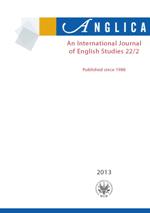The fates of OE *durran, etc in Middle English: a study in word geography
The fates of OE *durran, etc in Middle English: a study in word geography
Author(s): Magdalena TomaszewskaSubject(s): Language and Literature Studies
Published by: Wydawnictwa Uniwersytetu Warszawskiego
Keywords: preterite-present; modal verbs; Middle English dialects; modal auxiliaries; Innsbruck Corpus; dare
Summary/Abstract: OE *durran ‘dare’ is a preterite-present verb and one of six such verbs whose various forms have survived into Modern English. The main feature of the members of the group is that their strong past tense acquired a present meaning, and thus a new weak past tense developed over time. An outline of other characteristic features of these verbs is included in section ‘0’ (introductory remarks), yet the aim of the present paper is to establish the distribution of the verb *durran in Middle English with regard to periods and regions, also considering differences in spelling. Also, the paper examines fixed expressions such as how dare you or I dare say. The Middle English data are derived from the Prose corpus of the Innsbruck computer archive of machine-readable English texts. Additional sources, like the Dictionary of Old English on CD-ROM, the electronic Middle English dictionary and the Oxford English dictionary online are also referred to.
Journal: ANGLICA - An International Journal of English Studies
- Issue Year: 22/2013
- Issue No: 2
- Page Range: 41-58
- Page Count: 18

